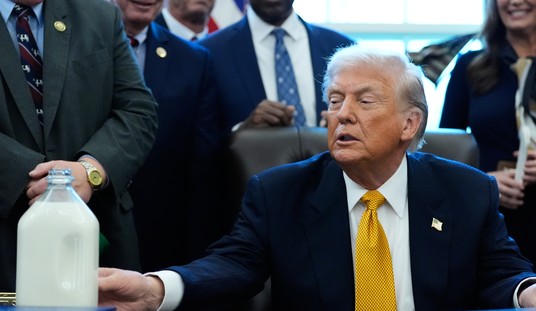The nation is not becoming libertarian, but the pendulum is swinging back toward liberty. HotAir.com's Noah Rothman reports for Townhall Magazine.
In August, New York Times reporter Robert Draper asked if America’s “libertarian moment” had finally arrived. Citing voters’ increasing trepidation about overseas interventionism and the apparent popularity of a laissez faire approach to divisive cultural issues, Draper observed that just such a “moment” was upon us.
The aestas horribilis of 2014 did advance the ball for libertarianism, but the complex American civic psyche often frustrates political taxonomists. It was more a form of conservatarianism—a synthesis of center-right philosophical approaches to unique sets of challenges—that was ascendant.
In late August, the shooting of an unarmed black teenager by a white police officer set the city of Ferguson, Missouri on fire. The suspicious circumstances of the teen’s death prompted familiar protests to erupt in the state and around the country. Unlike the response to racially charged incidents in the recent past, however, the civil unrest that followed this shooting was characterized by rioting, attacks on police, and the wonton destruction of property.
The response from the police was authoritative, but it was also indiscriminate. Peaceful demonstrators, rioters, and members of the press alike all felt the heavy hand of a militarized police force. The political reaction was astonishing; Right and Left, liberal and conservative, Americans of disparate racial and social backgrounds were alarmed. They did not recognize responders in Ferguson as the servants of a self-governed people.
Libertarian-leaning conservatives had long warned of a disturbing trend in which American police forces had adopted a pseudo-military posture. Suddenly, on the streets of Ferguson, the theoretical threat to American civil liberties materialized.
Openly libertarian leaders like Rep. Justin Amash (R-MI) and Sen. Rand Paul (R-KY) expressed their revulsion over the warlike response of the police to protests without regard to their level of unruliness. Tea party favorite Sen. Ted Cruz (R-TX), while also expressing his appreciation for the dangerous work in which law enforcement professionals engage, condemned the unexplained detention of reporters covering the unrest in Ferguson.
Liberal commentators who feared that civil rights had taken a backseat amid efforts to impose order welcomed their sentiments. Few on the Left dared to oppose the emerging consensus between Left and Right, and those who did were not rewarded. Utterly missing the moment, civil rights leader and Democratic icon Rep. John Lewis (D-GA) determined that the proper response to the unrest in Ferguson was to ask the president to “declare martial law” and “federalize the Missouri National Guard.” Perhaps hoping not to offend, Lewis’ ideological comrades largely ignored his comments.
“There’s a big difference between our military and local law enforcement and we don’t want those lines blurred,” President Obama finally conceded as violence between police and protesters continued to escalate. “That would be contrary to our traditions.”
This was a libertarian moment, but the summer was not wholly one of victories for those in favor of a smaller government footprint. Overseas, Americans bore witness to the fruits of a policy of benign neglect. Crises on three continents exploded, culminating in the rise of the worst threat to human dignity in generations.
In Europe, a revanchist Russia reacted to the imposition of economic sanctions in response to the invasion and annexation of the Crimean peninsula with an even more brazen campaign to destabilize Ukraine. The mirage of insulation enjoyed in the West was shattered in July when nearly 300 civilians, most of them Western Europeans, were blown out of the sky after pro-Moscow militants fired a sophisticated Russian missile at a pas- senger plane.
In Libya, where the president had celebrated the conclusion of a brief campaign to oust Muammar Gaddafi just three years prior, Islamist militants sacked town after town and encircled the capital.
And in Syria and Iraq, the Islamic State established a caliphate and engaged in a campaign of horrors the likes of which the world has not witnessed since the mid-20th century. There, the United States was made to pay for its inaction in 2013.
A year ago, most Americans regularly told pollsters that they objected to the president’s plan to execute airstrikes in Syria aimed at containing that conflagrating conflict. Obama relented to public pressure then, and the cancer in Syria metastasized. After months of dithering even after it became clear the Syrian civil war had developed into a regional conflict, Obama was forced to act. When the president finally ordered airstrikes in Iraq in order to relieve the pressure on American diplomatic and military personnel and to prevent the extermination of Iraqi minorities, he did so with the support of bipartisan majorities. Americans had once again internalized the bloody lessons of disengagement.
The message of the summer of 2014 is not so much that a libertarian moment had dawned, but that the American political pendulum is finally swinging—as it does with predictable regularity—back toward a conservatism of the late 20th century: Federalism at home; engagement, not adventurism, abroad; deference to the Constitution above all. It may not be a tectonic political shift, but America emerged from this past summer changed. The effects of that change have only begun to be felt. •
























Join the conversation as a VIP Member